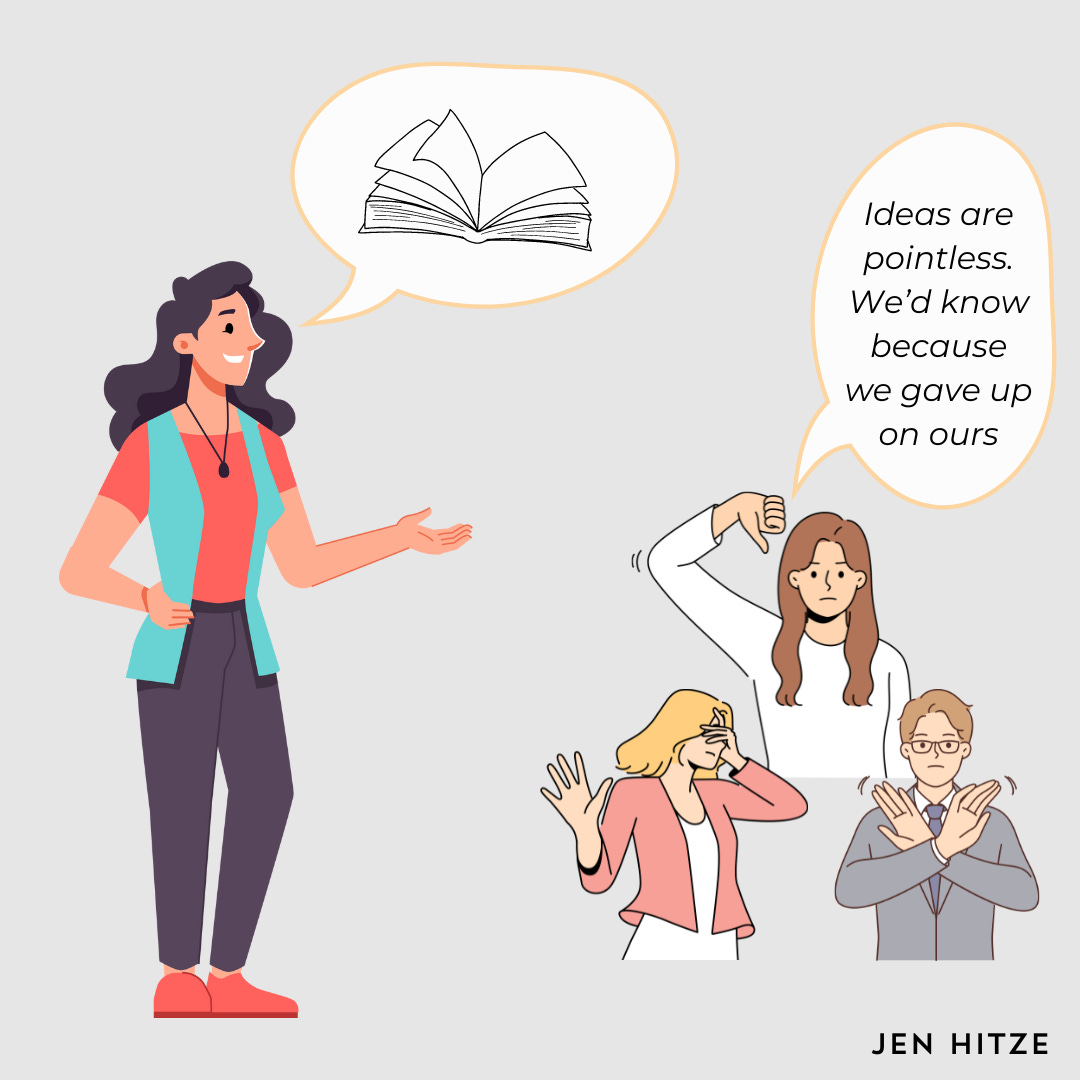Happiness, Deep Conversations, and Great Ideas
The Other Shore, Inherent Reward, Deep Connections, Nurturing Ideas, From Abstraction to Reality
I.
The Other Shore
Before enlightenment: chop wood, carry water. After enlightenment: chop wood, carry water.
Zen proverb
Most of us struggle with presence. We forget how to be. That’s because we’re perpetually trying to live in the future, constantly striving to get to the next place – a goal, a job, a location, etc. We find ourselves trapped on the hedonic treadmill, convinced that happiness, meaning, and peace await us at some distant destination.
This line of reasoning is illusory. There is no “place” where well-being resides. Even when we attain our ambitious goals (and we often do), the gratification we get is fleeting. Soon enough, we return to the same baseline level of satisfaction we had before achieving our aim. This isn’t to undermine the importance of goals; they undoubtedly add diverse experiences, challenges, and scenery to our lives. And occasionally they lead to financial prosperity, which always makes things easier. However, goals don’t inherently offer the happiness and fulfillment we long for. So, if well-being isn’t found in external accomplishments, where can we find it?
In Zen Buddhism, there’s a teaching: the other shore is right here, under your feet. This insight reminds us that what we seek is already present within us, accessible in the here and now. Despite having heard this wisdom before, a part of us still doesn’t believe it. So, we hop back on the Zen version of the hedonic treadmill – the rowboat – and we try to get to the next shore. Yet, each time we arrive, we realize it’s not the destination we sought. So we row towards a new shore, and the cycle continues.
That is until we realize that the “other shore” is beneath our feet. It always has been.
Well-being is found in being.
II.
Inherent Reward
No quantity of wealth, awards, or leisure can equate to happiness. Even if you dedicate your entire life to achieving wealth, fame, and ample free time, you may still find yourself unhappy.
So, instead of chasing after what you think will provide the most external rewards, do what brings you inner satisfaction. And don’t mistake my advice for the cliché, “follow your passion.” I recently wrote about passions and made the rationale that the word passion was never intended to describe one’s “pastime,” nor was it synonymous with “pleasure;” rather, it is more closely associated with pain.
What brings you inner satisfaction is your vocation – the thing you’re designed to do. It’s the thing that you know you’ll regret not having done when you’re on your deathbed. It’s the thing that scares the bejesus out of you, but shows up regularly in your daydreams. It won’t be easy, it probably won’t come naturally, and it will use you up.
But its pursuit will bring you fulfillment. You’ll be challenged and busy, you’ll utilize your unique gifts, and you’ll be an extraordinary success – all because you dared to take a leap of faith with your one life.
III.
Deep Connections
Speak only if your words are better than the silence.
Unknown (sometimes attributed to the Buddha)
Most of us desire deeper connections. We crave companions with whom we can explore big questions and share our inner truths. Yet, we find ourselves surrounded by superficial exchanges filled with trivial topics like personal updates, weekend plans, hearsay, or the latest social media trends. These conversations drain our time and energy, leaving us uninspired, triggered, and exhausted. When we exit these shallow exchanges, it sometimes feels as if we’ve been subjected to someone’s verbal vomit.
So, how do we foster more meaningful (and hygienic) exchanges? Should we try to elevate existing shallow connections to deeper levels, or should we seek out new relationships altogether?
In my experience, attempting to convert shallow acquaintances to the deep end often proves futile. Their inclination toward superficial dialogue often arises from inner unrest, as they seek distraction rather than introspection. Although these relationships may offer value in other aspects – like companionship or shared interests – fostering depth necessitates patiently awaiting the other party’s readiness to engage in more meaningful discussions, should they opt to do so.
Conversely, some people effortlessly gravitate towards deep conversations. These interactions often arise organically from a place of depth. For example, during a recent coffee date with a new friend, our conversation immediately delved into profound topics. Within the first 10 minutes, she asked about my thoughts on God – a question that both surprised and inspired me. Embracing the opportunity, I shared my thoughts and eagerly listened to hers. While not everyone resonates with the topic of God, her initial question revealed a genuine disinterest in small talk. And this weighty encounter only occurred because I gave up other shallow opportunities to create space for deep ones. When depth becomes a priority in your relationships, meaningful connections gravitate towards you.
What you seek is also seeking you.
IV.
Nurturing Ideas
These last two Big Ideas are inspired by the children’s book “What Do You Do With An Idea?” by Kobi Yamada. If you have a kid or know a kid (or are a kid at heart), I recommend it.
Great ideas arise unexpectedly and out of nowhere. One could say they originate as thought-forms: clearly defined within the confines of our minds, but lacking the tangibility of physical objects in the real world. Nevertheless, our idea’s yearning to surpass the barrier separating thoughts from things is undeniable.
Initially, when good ideas surface, we’ll opt to dismiss them. They might feel like they’re not ours, or we might dread how they could change things if they were to become real. However, upon attempting to abandon them, we realize how much better we feel in their presence. So, instead of discarding them, we nurture them with our attention.
As we begin brainstorming ways to actualize our ideas, they grow bigger. This excites us, so we decide to share our great ideas with others. But when we do, we’re met primarily with skepticism and criticism. That’s because most people give up on their ideas. So, when they come across others’, they tend to dismiss them as foolish, impractical, or pointless. This reaction serves as a defense mechanism, shielding the cynic from dwelling on what “could’ve been” had they not given up on their own big ideas. Yet, understanding this reality doesn’t lessen the sting of rejection. While our ideas may seem out there to others, they don’t feel that way to us. They feel almost as real as any “thing” in the real world.
So, instead of distancing ourselves from our ideas, we begin to distance ourselves from those who doubt us (and our ideas). This shift allows our ideas to thrive. With steadfast love and attention, our ideas undergo a gradual but steady transformation as they transition from the thought-world to the real one.
V.
From Abstraction to Reality
Big ideas make us feel alive, even when they exist solely as thought-forms inside our minds. Embracing them grants us the opportunity to view the world from their perspective. Our ideas remind us that anything is possible, revealing the secrets of their origin. When we love our idea more than our present reality and can’t imagine our future without it, we’ll invest everything into the idea’s manifestation. Every fiber of our being becomes dedicated to preparing the physical world for our idea’s emergence. And after many months (or, let’s be honest, years) of playing around with the ideas in our mind, suddenly, one day, they transform.
We don’t quite know how it happens, as we can’t see the place in between the thought-world and the real one. However, our ideas find their way through when we infuse them with the energy necessary to pass through the barrier. When this breakthrough transpires, our idea is no longer just on the inside; it’s on the outside. It permeates the external world and is all around us.
As our ideas materialize, the love once reserved for our mere thought-form becomes a profound appreciation for life itself. We cherish the toil and labor expended in bringing our ideas to fruition. We’re grateful for having entrusted our ideas with our whole hearts. And we realize we don’t regret giving up the people and things that tried to hold our ideas back from transcending the boundary between thoughts and things.
When our idea finally arrives, we come to understand what ideas really are.
Ideas are the ways in which we change the world.
5 Big Ideas is a free newsletter and a labor of love. If you find value in my ideas each week, consider financially supporting this newsletter for $5.
Another way to support 5 Big Ideas is to forward this email to someone you care about!
Lastly, a BIG thank you is due to Clement and StandardModel for your generous financial support – I’m beyond words!









I feel as if my present humanity, body and whatever constitutes spirit, has been massaged from head to toe, inside and out as I read your post. I have a Substack titled The Destination is Now, so my 80 years of life has brought me to the shore. Now is the only reality that exists, it is the shore on both sides of reality. Number I of your five is my present reality. I have made the leap, number II. I have sold everything I own, and live out of a backpack traveling outside the US full time, staying in Airbnb’s or hostels or friends I have made in former years when I traveled this way a couple of months a year (started that after my wife died almost 14 years ago). As to Number III, I almost daily have deep conversations with fellow travelers, young and old, no small talk. The first question is “Where are you from” and the next is “What brings you to this place (Airbnb, hostel)?” Answers provide a zip line ride to life stories, purpose, and often, understanding of the universe. Number IV is a perfect description of the what happened almost immediately after my wife died. A crazy idea popped into my mind, travel to New Zealand and climb mountains, someone I knew had done a couple of the Great Walks there. That idea spawned another. While I am in that part of the planet, go to Australia and ride a horse in the Snowy Mountains, as in my favorite movie, The Man From Snowy River. Logic added, snorkel the Great Barrier. I had never done a long hike, didn’t know how to ride a horse, and I am terrified of water never having learned to swim. At 67 I got a Physical Trainer, signed up for horseback riding lessons and swimming lessons. I left for two months in New Zealand and Australia 8 months later. And number V: I spent twenty years in a Spiritual Formation Group, probing the mystery imbedded in the Universe, and I have nurtured a fascination with Quantum theory and the search for a Unified Theory, whether the Quanta are made of strings or clumps. What you wrote resonated with me more and more as I read. Thank you!!!
1. The Distant Shore reminds me of Zeno's paradox of the walk to Athens. As a child, I thought it was merely a math problem. As I got older, I learned it was a metaphor for life: always be moving forward and step by step you will get one step closer to the final destination. The finish line represents perfection and nothing is 100% perfect but those steps get you closer so keep plugging away.
2. Meaningful conversation is a great way to find out who you really connect with but that small talk also serves a purpose and it is not entirely wasteful. It helps us disconnect from stress or helps us break the ice.
Use the first date analogy. You don't just dive into the deep end right off the bat. You take your time testing the unknown waters before you dive in.
You can also find a lot about someone in small talk. For example, as there are always pattern in person's behavior. Favorite color, favorite movies, or even social activities, can give us a clear outline of a person's motives, desires, and personality.